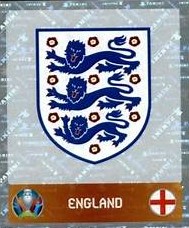 With the Euros just around the corner, we’ve got 51 matches across 30 undiluted days to look forward to, and an opportunity for England to bring home the trophy (or not, as the case may be). And there’s plenty in the way of England football autobiographies to keep you going if you really want to get into the spirit. From old classics brought out by Peter Crouch and Steven Gerrard, to newer releases from Stuart Pearce and Andrew Cole, and the 74 books from David Beckham (but who’s counting), there are already some great autobiographies from the Three Lions out there, but there’s always room for more. So here’s my top ten autobiographies of former England players that I’d like to read:
With the Euros just around the corner, we’ve got 51 matches across 30 undiluted days to look forward to, and an opportunity for England to bring home the trophy (or not, as the case may be). And there’s plenty in the way of England football autobiographies to keep you going if you really want to get into the spirit. From old classics brought out by Peter Crouch and Steven Gerrard, to newer releases from Stuart Pearce and Andrew Cole, and the 74 books from David Beckham (but who’s counting), there are already some great autobiographies from the Three Lions out there, but there’s always room for more. So here’s my top ten autobiographies of former England players that I’d like to read:
- Paul Ince
I had to double and triple-check that the player nicknamed ‘The Guvnor’, the midfielder with two Premier League titles, two FA Cups, a League Cup, three Charity Shields, a European Cup Winners’ Cup and a European Super Cup to his name, and that’s just whilst at Manchester United – as well as over 50 England caps – has never written an autobiography, but he hasn’t. An alumni of West Ham, Inter Milan, Liverpool, Middlesbrough and Wolves, and a key cog in both Euro96 and the 1998 World Cup, before a managerial career spanning Swindon Town, Macclesfield Town, Milton Keyes Dons, Blackburn Rovers, Notts County and Blackpool, Paul Ince has had a remarkable football life and surely has some stories to tell, not least as ‘Gazza’s minder’ on England duty.
- David James
 There are probably few England goalkeepers more iconic than David James, whether that’s doing his stuff between the sticks or trying his hand up front for Manchester City. It’s said that goalkeepers are a different breed and there’s no doubt there’s something mercurial about James. As well as being part of Liverpool’s Spice Boys generation and an FA Cup winner at Portsmouth, James served as first-choice keeper in Euro2004 and the 2010 World Cup. His playing career spanned some 10 clubs, including outings in both Iceland and India, and he sits fourth on the list of all-time Premier League appearances, is second only to Petr Cech for clean sheets and tops the charts for penalty saves. Away from the pitch, he is an accomplished artist and competed on Strictly Come Dancing, but it’s his on-the-pitch life, in some memorable teams with some memorable players and managers that James’ story really lies.
There are probably few England goalkeepers more iconic than David James, whether that’s doing his stuff between the sticks or trying his hand up front for Manchester City. It’s said that goalkeepers are a different breed and there’s no doubt there’s something mercurial about James. As well as being part of Liverpool’s Spice Boys generation and an FA Cup winner at Portsmouth, James served as first-choice keeper in Euro2004 and the 2010 World Cup. His playing career spanned some 10 clubs, including outings in both Iceland and India, and he sits fourth on the list of all-time Premier League appearances, is second only to Petr Cech for clean sheets and tops the charts for penalty saves. Away from the pitch, he is an accomplished artist and competed on Strictly Come Dancing, but it’s his on-the-pitch life, in some memorable teams with some memorable players and managers that James’ story really lies.
- Jermain Defoe
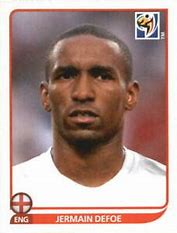 If it was up to me, Jermain Defoe’s 57 England caps running up to 2017 would be double that number, but alas (maybe thankfully), I’m not the England manager. There is no doubting though Defoe’s goalscoring instinct, continuing to get his name on the scoresheet north of the border as his Rangers side secured the 2020/21 league title. Starting with West Ham, his move to Tottenham probably did him no favours with the claret side of London, but it was with the Lilywhites where he really made his mark across two spells and a loan. Wherever he has played, including for the national team, Defoe has found the net, and yet he’s probably suffered from the tag of super sub – indeed, he’s the Premier League’s top scorer as a sub. However, he’s also the eighth-highest goalscorer in Premier League history and still isn’t too shabby at 38. When he eventually hangs up his boots, there will be one incredible journey to look back on.
If it was up to me, Jermain Defoe’s 57 England caps running up to 2017 would be double that number, but alas (maybe thankfully), I’m not the England manager. There is no doubting though Defoe’s goalscoring instinct, continuing to get his name on the scoresheet north of the border as his Rangers side secured the 2020/21 league title. Starting with West Ham, his move to Tottenham probably did him no favours with the claret side of London, but it was with the Lilywhites where he really made his mark across two spells and a loan. Wherever he has played, including for the national team, Defoe has found the net, and yet he’s probably suffered from the tag of super sub – indeed, he’s the Premier League’s top scorer as a sub. However, he’s also the eighth-highest goalscorer in Premier League history and still isn’t too shabby at 38. When he eventually hangs up his boots, there will be one incredible journey to look back on.
- Danny Rose
There are a multitude of voices and stories in football, though often, it seems, we only get to hear a few of these. In recent years, however, Danny Rose has stood out above the parapet to offer a snapshot of himself and his experience in football, and it hasn’t always been glowing. As his 14-year association with Tottenham recently came to an end, having been one of the latest to fall out of favour with Jose Mourinho, his future currently remains uncertain, but at his height he was one of the best left-backs in the country. Rose’s off-the-pitch struggles have made headlines, but his speaking out on depression was not only a significant move for him but for football, and one that merits a lot of respect and support. Rose deserves the right to share his story as much or as little as he wishes, but I’m sure there will be many, both within football and beyond, for whom Rose’s story will be pertinent.
- Micah Richards
 Is there any more entertaining a pundit than Micah Richards? Whether he’s being completely fanatical about Manchester City, telling Phil Foden he loves him live on TV or cementing his bromance with a reluctant Roy Keane, Micah Richards was made for the gig. On the pitch, he was part of the transformation that saw Manchester City enter the footballing elite following that historic first title in over forty years, alongside the likes of Vincent Kompany, Sergio Aguero, Yaya Toure, David Silva and Mario Balotelli. His decade at City was followed by less auspicious spells at Fiorentina and Aston Villa, whilst only 13 England caps surely doesn’t do the defender justice. He did feature in the 2012 Olympic football team, but whilst it’s his career at the Etihad that he’ll be remembered for, his TV career may yet surpass even that. Who knows, perhaps even a book with Roy Keane could be on the cards – now that would be worth a read.
Is there any more entertaining a pundit than Micah Richards? Whether he’s being completely fanatical about Manchester City, telling Phil Foden he loves him live on TV or cementing his bromance with a reluctant Roy Keane, Micah Richards was made for the gig. On the pitch, he was part of the transformation that saw Manchester City enter the footballing elite following that historic first title in over forty years, alongside the likes of Vincent Kompany, Sergio Aguero, Yaya Toure, David Silva and Mario Balotelli. His decade at City was followed by less auspicious spells at Fiorentina and Aston Villa, whilst only 13 England caps surely doesn’t do the defender justice. He did feature in the 2012 Olympic football team, but whilst it’s his career at the Etihad that he’ll be remembered for, his TV career may yet surpass even that. Who knows, perhaps even a book with Roy Keane could be on the cards – now that would be worth a read.
- Joe Hart
 Charles Joseph John Hart, aka Joe Hart, was another former City player who was instrumental to Manchester City’s changing fortunes, where he won two Premier League titles, two League Cups and an FA Cup. Another member of the goalkeepers’ union, Hart was first-choice for England in Euro 2012 and 2016 and the 2014 World Cup, notching up some 75 caps. Domestically, he was the first of only two players (the other being Petr Cech) to win four Golden Glove awards and although he featured only in cup games in 2020/21 for latest club Tottenham, at 34 he remains very much part of the top-flight set-up. Goalkeepers’ careers are invariably full of more ups and downs, and Joe Hart has had his fair share of both.
Charles Joseph John Hart, aka Joe Hart, was another former City player who was instrumental to Manchester City’s changing fortunes, where he won two Premier League titles, two League Cups and an FA Cup. Another member of the goalkeepers’ union, Hart was first-choice for England in Euro 2012 and 2016 and the 2014 World Cup, notching up some 75 caps. Domestically, he was the first of only two players (the other being Petr Cech) to win four Golden Glove awards and although he featured only in cup games in 2020/21 for latest club Tottenham, at 34 he remains very much part of the top-flight set-up. Goalkeepers’ careers are invariably full of more ups and downs, and Joe Hart has had his fair share of both.
- Joleon Lescott
When Joleon Lescott won promotion to the Premier League with boyhood club Wolves, he must have thought his career was just about to begin, but knee surgery saw him miss the whole 2003/04 season, in which Wolves were instantly relegated. However, when Lescott signed for Everton in 2006, he finally got his opportunity, and even bigger and better times were to come at Manchester City. After winning four trophies at the Etihad, spells at West Brom, Villa, AEK Athens and Sunderland followed, but Lescott had had his moment in the sun, a moment which saw him receive some 26 England caps. Perhaps not a big name in either Man City or England history, but Lescott’s rise to the top is surely the archetypal boy done good story.
- Jack Wilshere
 When Jack Wilshere burst onto the scene at Arsenal as a mere 16-year-old gracing the first team, he looked to have one of the brightest futures in both domestic and international football ahead of him, epitomised by being awarded the PFA Young Player of the Year in 2011. Sadly, Wilshere’s career has never reached its promised heights, having been blighted by injury from the outset. Yet in between times, Wilshere managed almost 200 appearances for Arsenal, including two FA Cup triumphs, a Community Shield, and two – yes, two – BBC Goal of the Season awards, as well as some 34 caps for England. Wilshere’s talent dazzled brightly in glimpses, but his story, more than most others’, encapsulates the devastation of injury and the resilience and determination to return again and again. If there is anyone qualified to explain that road to recovery and the tragedy of injury setback, it’s surely Jack Wilshere.
When Jack Wilshere burst onto the scene at Arsenal as a mere 16-year-old gracing the first team, he looked to have one of the brightest futures in both domestic and international football ahead of him, epitomised by being awarded the PFA Young Player of the Year in 2011. Sadly, Wilshere’s career has never reached its promised heights, having been blighted by injury from the outset. Yet in between times, Wilshere managed almost 200 appearances for Arsenal, including two FA Cup triumphs, a Community Shield, and two – yes, two – BBC Goal of the Season awards, as well as some 34 caps for England. Wilshere’s talent dazzled brightly in glimpses, but his story, more than most others’, encapsulates the devastation of injury and the resilience and determination to return again and again. If there is anyone qualified to explain that road to recovery and the tragedy of injury setback, it’s surely Jack Wilshere.
- Theo Walcott
England’s youngest ever senior player and youngest hat-trick scorer, Theo Walcott was the quintessential young gun when he came to the world’s attention in an England shirt at the age of 17. It was a meteoric rise for a young man whose career had started at Southampton, before he was catapulted into Arsenal and England. And although he reached nearly 400 appearances for Arsenal, a further 85 for Everton and continues to ply his trade at boyhood club Southampton, like his Arsenal and England team-mate, Jack Wilshere, Walcott’s career has been stop-start due to injury and he too, perhaps never reached his full potential. However, there are few who have had such high expectations placed on their shoulders at such a young age and on such a significant stage and Walcott’s journey has always had that auspicious start looming over it.
- Jermaine Jenas
Younger fans may be forgiven for thinking Jermaine Jenas is simply a TV presenter, his recent One Show promotion has certainly made him into a household name, but slightly older supporters will remember Jenas as an athletic midfielder who plied his trade at Nottingham Forest, Newcastle United, Tottenham, Villa and QPR, as well as representing his country over 20 times. Another young starter, Jenas was named PFA Young Player of the Year in 2003, but he, too, was blighted with injuries. Nonetheless, his time at Newcastle saw him play under inspirational leader Bobby Robson and Geordie legend Alan Shearer, whilst his move to Tottenham saw him win the only trophy of his career – the League Cup. Internationally, Jenas remained largely on the fringes, making the squad but not featuring in the 2006 World Cup and his experiences in and around football are a familiar case of so near but yet so far.
Jade Craddock
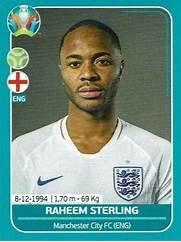 Group D: England (0) 1 – 0 (0) Croatia
Group D: England (0) 1 – 0 (0) Croatia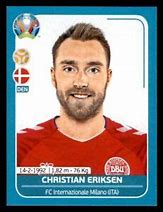 Eriksen impact: Firstly, having witnessed the horrific events in the Denmark v Finland game the previous day, I imagine twenty-four hours on, the football world’s thoughts were very much on Christian Eriksen and his recovery. The immediate and continued reaction showed once more the incredible and special unity possible in football. Regardless of nationality, club allegiance, interest, at moments like this, football unites in worry, hope and mostly support and it’s a poignant and powerful thing. Naturally, whilst the Danish and Finnish players were obviously those most closely affected, every team has players who will have crossed paths to varying degrees with Eriksen – past teammates, like Harry Kane and Jan Vertonghen, current teammates like Romelu Lukaku and Ivan Perisic, and myriad opposition players – and even for those who haven’t, I can’t imagine there was any player, fan or human being not affected. And even as the tournament continues, for the players involved what happened will surely play on their minds. Fortunately, a rapid and experienced medical response and the noble reaction of teammates, opposition and officials had a huge impact, but it also perhaps served as a reminder of the importance of first aid and emergency support at all levels of the game. Christian Eriksen will remain at the forefront of the thoughts and best wishes of everyone and although there is still a tournament being played, Eriksen’s recovery is the greatest victory that there can be.
Eriksen impact: Firstly, having witnessed the horrific events in the Denmark v Finland game the previous day, I imagine twenty-four hours on, the football world’s thoughts were very much on Christian Eriksen and his recovery. The immediate and continued reaction showed once more the incredible and special unity possible in football. Regardless of nationality, club allegiance, interest, at moments like this, football unites in worry, hope and mostly support and it’s a poignant and powerful thing. Naturally, whilst the Danish and Finnish players were obviously those most closely affected, every team has players who will have crossed paths to varying degrees with Eriksen – past teammates, like Harry Kane and Jan Vertonghen, current teammates like Romelu Lukaku and Ivan Perisic, and myriad opposition players – and even for those who haven’t, I can’t imagine there was any player, fan or human being not affected. And even as the tournament continues, for the players involved what happened will surely play on their minds. Fortunately, a rapid and experienced medical response and the noble reaction of teammates, opposition and officials had a huge impact, but it also perhaps served as a reminder of the importance of first aid and emergency support at all levels of the game. Christian Eriksen will remain at the forefront of the thoughts and best wishes of everyone and although there is still a tournament being played, Eriksen’s recovery is the greatest victory that there can be. Home advantage?: As part of its 60th anniversary celebrations, UEFA opted to move away from its traditional approach of a single or two countries hosting the event to a fully pan-European tournament, which is a nice idea in principle, but in reality isn’t perhaps the most sensible, not least in these COVID times, but there we have it. Sadly, I’m not party to UEFA’s machinations so am unsure as to why it was 11 cities that were chosen, but each of the qualifying host nations are granted the opportunity to play at least two groups matches at home, whilst six nations, including Italy, Denmark, Netherlands, Spain, Germany and, crucially, England will play all three group games at home venues. Contrast this to Belgium who are flitting between St Petersburg and Copenhagen and Wales who find themselves manoeuvred between Azerbaijan and Rome, and you have to feel that there is a home advantage for England. More so than any other tournament, when teams would be based in a country and travel would be limited within that nation, or nations, travel and moving camps has to be more of a factor than ever. The group stages and knockout rounds will see the competition similarly spread across various destinations, but notably with the semi-finals and finals scheduled for Wembley, there is a real incentive and motivation for England to thrive. However, given that home nations have only won the Euros three times, perhaps we should give one of the other nations the title of home nation.
Home advantage?: As part of its 60th anniversary celebrations, UEFA opted to move away from its traditional approach of a single or two countries hosting the event to a fully pan-European tournament, which is a nice idea in principle, but in reality isn’t perhaps the most sensible, not least in these COVID times, but there we have it. Sadly, I’m not party to UEFA’s machinations so am unsure as to why it was 11 cities that were chosen, but each of the qualifying host nations are granted the opportunity to play at least two groups matches at home, whilst six nations, including Italy, Denmark, Netherlands, Spain, Germany and, crucially, England will play all three group games at home venues. Contrast this to Belgium who are flitting between St Petersburg and Copenhagen and Wales who find themselves manoeuvred between Azerbaijan and Rome, and you have to feel that there is a home advantage for England. More so than any other tournament, when teams would be based in a country and travel would be limited within that nation, or nations, travel and moving camps has to be more of a factor than ever. The group stages and knockout rounds will see the competition similarly spread across various destinations, but notably with the semi-finals and finals scheduled for Wembley, there is a real incentive and motivation for England to thrive. However, given that home nations have only won the Euros three times, perhaps we should give one of the other nations the title of home nation. Kalvin Phillips: There was much talk going into the tournament around attacking players – Should Sancho be included? Would Grealish be fit? How on earth can we fit in all of these attacking options? – and then when the squad announcement was made attention turned to Harry Maguire and the four right-backs, whilst one man went largely under the radar – Kalvin Phillips. After an excellent couple of seasons with Leeds, Phillips got a much-deserved first England call-up in August last year and hasn’t looked back. Indeed, perhaps most notably, there was never any question of him making Gareth Southgate’s final 26 – his name never came up for discussion. But as the tournament neared and a lot of focus turned to Jordan Henderson’s fitness and possible return, the question of midfield partnerships suddenly arose. Phillips found himself named alongside Rice, but with Jordan Henderson continuing to build towards his return, the spotlight was on, and Phillips didn’t disappoint, putting in a superb performance, both breaking up play and pushing forward, crucially for England’s goal. He took his chance with both hands and surely deserves his spot against Scotland. Tyrone Mings who was similarly under the microscope in what has been deemed a problem area for England with the injury to Harry Maguire put in a solid performance, whilst Foden was, as ever, a shining light. Had Euro 2020 not been delayed, Phillips and Foden, neither of whom made their debuts until August 2020, and Mings, who was still breaking through, may not have featured. What a difference twelve months makes!
Kalvin Phillips: There was much talk going into the tournament around attacking players – Should Sancho be included? Would Grealish be fit? How on earth can we fit in all of these attacking options? – and then when the squad announcement was made attention turned to Harry Maguire and the four right-backs, whilst one man went largely under the radar – Kalvin Phillips. After an excellent couple of seasons with Leeds, Phillips got a much-deserved first England call-up in August last year and hasn’t looked back. Indeed, perhaps most notably, there was never any question of him making Gareth Southgate’s final 26 – his name never came up for discussion. But as the tournament neared and a lot of focus turned to Jordan Henderson’s fitness and possible return, the question of midfield partnerships suddenly arose. Phillips found himself named alongside Rice, but with Jordan Henderson continuing to build towards his return, the spotlight was on, and Phillips didn’t disappoint, putting in a superb performance, both breaking up play and pushing forward, crucially for England’s goal. He took his chance with both hands and surely deserves his spot against Scotland. Tyrone Mings who was similarly under the microscope in what has been deemed a problem area for England with the injury to Harry Maguire put in a solid performance, whilst Foden was, as ever, a shining light. Had Euro 2020 not been delayed, Phillips and Foden, neither of whom made their debuts until August 2020, and Mings, who was still breaking through, may not have featured. What a difference twelve months makes! Hey, Jude: Can you remember what you were doing at 17? Learning to drive, perhaps; maybe taking exams, or even something a little less virtuous. Whatever it was, it wouldn’t have been representing your country in the Euros. In fact, only one person in history can claim that achievement in the men’s Euros – Jude Bellingham. When he was brought on as a sub against Croatia, at the age of 17 years and 349 days, Bellingham broke the previous record held by Jetro Willems of the Netherlands, who was 18 years and 71 days when he featured in Euro 2012. Bellingham is also some 23 years younger than the oldest ever player at the Euros – Gabor Kiraly of Hungary, who was 40 years and 86 days – and 22 years younger than the oldest ever outfield player – Germany’s Lothar Matthaus, who was 39 years and 91 days. The teenager joins an illustrious group of players who hold the honour of being the youngest players for their nations at the Euros, including Ivan Rakitic (Croatia), Tomas Rosicky (Czech Republic), Michael Laudrup (Denmark), Lukas Podolski (Germany) and Paolo Mancini (Italy) to name a few. In terms of the youngest goalscorer at the Euros, Johan Vonlanthen of Switzerland currently holds that title, aged 18 years and 141 days, so Bellingham could feasibly take that one too. Oh, and one other record of note, the youngest player to feature in a Euros final was Renato Sanches of Portugal, aged 18 years and 327 days. Jude Bellingham only turns 18 twelve days before the final, just saying…
Hey, Jude: Can you remember what you were doing at 17? Learning to drive, perhaps; maybe taking exams, or even something a little less virtuous. Whatever it was, it wouldn’t have been representing your country in the Euros. In fact, only one person in history can claim that achievement in the men’s Euros – Jude Bellingham. When he was brought on as a sub against Croatia, at the age of 17 years and 349 days, Bellingham broke the previous record held by Jetro Willems of the Netherlands, who was 18 years and 71 days when he featured in Euro 2012. Bellingham is also some 23 years younger than the oldest ever player at the Euros – Gabor Kiraly of Hungary, who was 40 years and 86 days – and 22 years younger than the oldest ever outfield player – Germany’s Lothar Matthaus, who was 39 years and 91 days. The teenager joins an illustrious group of players who hold the honour of being the youngest players for their nations at the Euros, including Ivan Rakitic (Croatia), Tomas Rosicky (Czech Republic), Michael Laudrup (Denmark), Lukas Podolski (Germany) and Paolo Mancini (Italy) to name a few. In terms of the youngest goalscorer at the Euros, Johan Vonlanthen of Switzerland currently holds that title, aged 18 years and 141 days, so Bellingham could feasibly take that one too. Oh, and one other record of note, the youngest player to feature in a Euros final was Renato Sanches of Portugal, aged 18 years and 327 days. Jude Bellingham only turns 18 twelve days before the final, just saying… Tough test: England’s 1-0 victory over Croatia ensured England’s best ever start to a Euros; indeed, they had never won their first game at the tournament before. Whilst there were a lot of positives to take from the match, there is, naturally, room for improvement. It is difficult to be at your best in the first game, nor, quite honestly, would you want to be, hoping to build into the competition, so a victory and three points was the most important thing, and against a Croatia side who have been known to cause the odd England upset, it was a solid enough start, but the next game against Scotland may be an even bigger challenge. It is, after all, the oldest rivalry in football, dating back to 1872, and has seen some 113 matches, of which England hold a slight advantage, including in recent years, although the most recent result was a 2-2 draw. Whilst England’s biggest victory was 9-3 in 1961 and Scotland’s 7-2 in 1878, which would make for entertaining affairs, I suspect it will be a much-closer and harder-fought contest when the two sides meet on Friday. England will be looking to build momentum, whilst Scotland will be wanting to make the most of their first major tournament in 23 years. With the likes of Andy Robertson, Scott McTominay and John McGinn, Scotland will be familiar but formidable opponents and surely buoyed by a match against England. The Three Lions will face a tough test and will certainly need to raise their game to keep their 100% start in the tournament.
Tough test: England’s 1-0 victory over Croatia ensured England’s best ever start to a Euros; indeed, they had never won their first game at the tournament before. Whilst there were a lot of positives to take from the match, there is, naturally, room for improvement. It is difficult to be at your best in the first game, nor, quite honestly, would you want to be, hoping to build into the competition, so a victory and three points was the most important thing, and against a Croatia side who have been known to cause the odd England upset, it was a solid enough start, but the next game against Scotland may be an even bigger challenge. It is, after all, the oldest rivalry in football, dating back to 1872, and has seen some 113 matches, of which England hold a slight advantage, including in recent years, although the most recent result was a 2-2 draw. Whilst England’s biggest victory was 9-3 in 1961 and Scotland’s 7-2 in 1878, which would make for entertaining affairs, I suspect it will be a much-closer and harder-fought contest when the two sides meet on Friday. England will be looking to build momentum, whilst Scotland will be wanting to make the most of their first major tournament in 23 years. With the likes of Andy Robertson, Scott McTominay and John McGinn, Scotland will be familiar but formidable opponents and surely buoyed by a match against England. The Three Lions will face a tough test and will certainly need to raise their game to keep their 100% start in the tournament. Group A: Wales (0) 1 – 1 (0) Switzerland
Group A: Wales (0) 1 – 1 (0) Switzerland It seems that every man and his dog has been picking their England XI for the Croatia game, so why not jump on that proverbial bandwagon and add my own tuppence to the mix. I’m sure Gareth Southgate and his team will have been waiting on tenterhooks for my selection, although I suspect if our line-ups don’t quite match up, it’s probably because I just missed the cut-off point for getting the teamsheet in.
It seems that every man and his dog has been picking their England XI for the Croatia game, so why not jump on that proverbial bandwagon and add my own tuppence to the mix. I’m sure Gareth Southgate and his team will have been waiting on tenterhooks for my selection, although I suspect if our line-ups don’t quite match up, it’s probably because I just missed the cut-off point for getting the teamsheet in.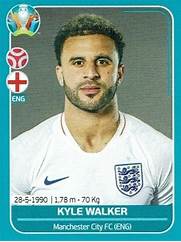 Right-back: Kyle Walker
Right-back: Kyle Walker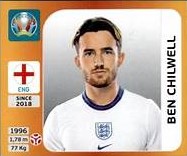 Left-back: Ben Chilwell
Left-back: Ben Chilwell Attacking-midfield: Phil Foden
Attacking-midfield: Phil Foden Striker: Harry Kane
Striker: Harry Kane And so it begins. After a wait of over a year, Euro 2020 (yes, we’re sticking with that) finally kicked off last night in Rome as Italy took on Turkey in Group A, and for once, it didn’t disappoint. It had everything from Nessun Dorma to dodgy offsides to super-size subs benches. But as I sum up some random observations from the opening fixture, there’s only one place to start, remote-controlled cars, naturally…
And so it begins. After a wait of over a year, Euro 2020 (yes, we’re sticking with that) finally kicked off last night in Rome as Italy took on Turkey in Group A, and for once, it didn’t disappoint. It had everything from Nessun Dorma to dodgy offsides to super-size subs benches. But as I sum up some random observations from the opening fixture, there’s only one place to start, remote-controlled cars, naturally… Group A: Turkey (0) 0 – 3 (0) Italy
Group A: Turkey (0) 0 – 3 (0) Italy Italy and Turkey get the delayed Euro 2020 tournament underway at the Stadio Olimpico in Rome tonight. The Italians topped their Group in qualifying with a 100% record having beaten Finland, Greece, Bosnia and Herzegovina, Armenia and Liechtenstein both home and away. The Azzuri scored 37 goals and conceded just 4 as they romped home twelve points clear of second-placed Finland. Turkey came through as runners-up in their qualifying campaign, finishing just two points behind France, in a Group that also contained Iceland, Albania, Andorra and Moldova. The Crescent Stars beat France in the Group stages but lost out on top-stop after only picking up a point in their two meetings with Iceland.
Italy and Turkey get the delayed Euro 2020 tournament underway at the Stadio Olimpico in Rome tonight. The Italians topped their Group in qualifying with a 100% record having beaten Finland, Greece, Bosnia and Herzegovina, Armenia and Liechtenstein both home and away. The Azzuri scored 37 goals and conceded just 4 as they romped home twelve points clear of second-placed Finland. Turkey came through as runners-up in their qualifying campaign, finishing just two points behind France, in a Group that also contained Iceland, Albania, Andorra and Moldova. The Crescent Stars beat France in the Group stages but lost out on top-stop after only picking up a point in their two meetings with Iceland. Dele Alli
Dele Alli
 Conor Coady
Conor Coady Mason Mount
Mason Mount Tyrone Mings
Tyrone Mings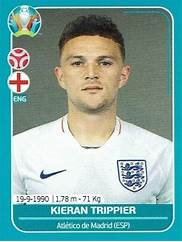 Kieran Trippier
Kieran Trippier There are probably few England goalkeepers more iconic than David James, whether that’s doing his stuff between the sticks or trying his hand up front for Manchester City. It’s said that goalkeepers are a different breed and there’s no doubt there’s something mercurial about James. As well as being part of Liverpool’s Spice Boys generation and an FA Cup winner at Portsmouth, James served as first-choice keeper in Euro2004 and the 2010 World Cup. His playing career spanned some 10 clubs, including outings in both Iceland and India, and he sits fourth on the list of all-time Premier League appearances, is second only to Petr Cech for clean sheets and tops the charts for penalty saves. Away from the pitch, he is an accomplished artist and competed on Strictly Come Dancing, but it’s his on-the-pitch life, in some memorable teams with some memorable players and managers that James’ story really lies.
There are probably few England goalkeepers more iconic than David James, whether that’s doing his stuff between the sticks or trying his hand up front for Manchester City. It’s said that goalkeepers are a different breed and there’s no doubt there’s something mercurial about James. As well as being part of Liverpool’s Spice Boys generation and an FA Cup winner at Portsmouth, James served as first-choice keeper in Euro2004 and the 2010 World Cup. His playing career spanned some 10 clubs, including outings in both Iceland and India, and he sits fourth on the list of all-time Premier League appearances, is second only to Petr Cech for clean sheets and tops the charts for penalty saves. Away from the pitch, he is an accomplished artist and competed on Strictly Come Dancing, but it’s his on-the-pitch life, in some memorable teams with some memorable players and managers that James’ story really lies. If it was up to me, Jermain Defoe’s 57 England caps running up to 2017 would be double that number, but alas (maybe thankfully), I’m not the England manager. There is no doubting though Defoe’s goalscoring instinct, continuing to get his name on the scoresheet north of the border as his Rangers side secured the 2020/21 league title. Starting with West Ham, his move to Tottenham probably did him no favours with the claret side of London, but it was with the Lilywhites where he really made his mark across two spells and a loan. Wherever he has played, including for the national team, Defoe has found the net, and yet he’s probably suffered from the tag of super sub – indeed, he’s the Premier League’s top scorer as a sub. However, he’s also the eighth-highest goalscorer in Premier League history and still isn’t too shabby at 38. When he eventually hangs up his boots, there will be one incredible journey to look back on.
If it was up to me, Jermain Defoe’s 57 England caps running up to 2017 would be double that number, but alas (maybe thankfully), I’m not the England manager. There is no doubting though Defoe’s goalscoring instinct, continuing to get his name on the scoresheet north of the border as his Rangers side secured the 2020/21 league title. Starting with West Ham, his move to Tottenham probably did him no favours with the claret side of London, but it was with the Lilywhites where he really made his mark across two spells and a loan. Wherever he has played, including for the national team, Defoe has found the net, and yet he’s probably suffered from the tag of super sub – indeed, he’s the Premier League’s top scorer as a sub. However, he’s also the eighth-highest goalscorer in Premier League history and still isn’t too shabby at 38. When he eventually hangs up his boots, there will be one incredible journey to look back on. Is there any more entertaining a pundit than Micah Richards? Whether he’s being completely fanatical about Manchester City, telling Phil Foden he loves him live on TV or cementing his bromance with a reluctant Roy Keane, Micah Richards was made for the gig. On the pitch, he was part of the transformation that saw Manchester City enter the footballing elite following that historic first title in over forty years, alongside the likes of Vincent Kompany, Sergio Aguero, Yaya Toure, David Silva and Mario Balotelli. His decade at City was followed by less auspicious spells at Fiorentina and Aston Villa, whilst only 13 England caps surely doesn’t do the defender justice. He did feature in the 2012 Olympic football team, but whilst it’s his career at the Etihad that he’ll be remembered for, his TV career may yet surpass even that. Who knows, perhaps even a book with Roy Keane could be on the cards – now that would be worth a read.
Is there any more entertaining a pundit than Micah Richards? Whether he’s being completely fanatical about Manchester City, telling Phil Foden he loves him live on TV or cementing his bromance with a reluctant Roy Keane, Micah Richards was made for the gig. On the pitch, he was part of the transformation that saw Manchester City enter the footballing elite following that historic first title in over forty years, alongside the likes of Vincent Kompany, Sergio Aguero, Yaya Toure, David Silva and Mario Balotelli. His decade at City was followed by less auspicious spells at Fiorentina and Aston Villa, whilst only 13 England caps surely doesn’t do the defender justice. He did feature in the 2012 Olympic football team, but whilst it’s his career at the Etihad that he’ll be remembered for, his TV career may yet surpass even that. Who knows, perhaps even a book with Roy Keane could be on the cards – now that would be worth a read. Charles Joseph John Hart, aka Joe Hart, was another former City player who was instrumental to Manchester City’s changing fortunes, where he won two Premier League titles, two League Cups and an FA Cup. Another member of the goalkeepers’ union, Hart was first-choice for England in Euro 2012 and 2016 and the 2014 World Cup, notching up some 75 caps. Domestically, he was the first of only two players (the other being Petr Cech) to win four Golden Glove awards and although he featured only in cup games in 2020/21 for latest club Tottenham, at 34 he remains very much part of the top-flight set-up. Goalkeepers’ careers are invariably full of more ups and downs, and Joe Hart has had his fair share of both.
Charles Joseph John Hart, aka Joe Hart, was another former City player who was instrumental to Manchester City’s changing fortunes, where he won two Premier League titles, two League Cups and an FA Cup. Another member of the goalkeepers’ union, Hart was first-choice for England in Euro 2012 and 2016 and the 2014 World Cup, notching up some 75 caps. Domestically, he was the first of only two players (the other being Petr Cech) to win four Golden Glove awards and although he featured only in cup games in 2020/21 for latest club Tottenham, at 34 he remains very much part of the top-flight set-up. Goalkeepers’ careers are invariably full of more ups and downs, and Joe Hart has had his fair share of both.